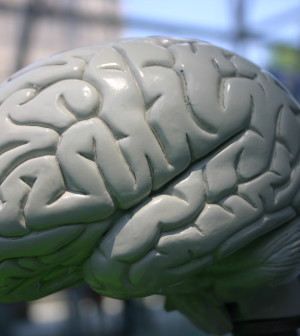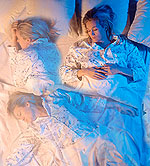- Could Your Grocery Store Meat Be Causing Recurring UTIs?
- Are You Making This Expensive Thermostat Error This Winter?
- Recognizing the Signs of Hypothyroidism
- 10 Strategies to Overcome Insomnia
- Could Artificial Sweeteners Be Aging the Brain Faster?
- Techniques for Soothing Your Nervous System
- Does the Water in Your House Smell Funny? Here’s Why
- Can a Daily Dose of Apple Cider Vinegar Actually Aid Weight Loss?
- 6 Health Beverages That Can Actually Spike Your Blood Sugar
- Treatment Options for Social Anxiety Disorder
‘Sleep Drunkenness’ Is Common and Linked to Other Behavior Issues


“Sleep drunkenness” is more common than previously thought, affecting about one in 15 Americans, according to a new study that looked at the sleeping habits of more than 19,000 adults.
Also called confusional arousal, the condition causes people to wake up in a confused state, not knowing where they are. In the most severe cases, they can injure themselves or others, explained lead researcher Dr. Maurice Ohayon, a professor of psychiatry at Stanford University School of Medicine.
“There was a case of a man on a ship who awoke in a confused state and fell off the deck to his death,” Ohayon said.
In addition to such extreme cases, there have been cases where waking up in a confused state led to the person striking a bedmate. Most people can’t remember the incident afterwards.
Ohayon noted that these episodes can occur even while taking a nap. “This happens to most people occasionally, like when you are jet-lagged,” he said. The difference is that these episodes are frequent among those who suffer from confusional arousal, he noted.
Treatment for confusional arousal hinges on treating the other sleep problems patients have, Ohayon said. When these problems are treated, the condition often disappears.
Whether sleep drunkenness is its own condition or a symptom of other sleep problems is an ongoing debate, Ohayon noted.
The report was published in the Aug. 26 issue of the journal Neurology.
Dr. David Rye, a professor of neurology at Emory University in Atlanta, said, “Confusional arousals exist — and are probably more common than we thought.”
But, he added, “As in most epidemiological surveys, what is reported are associations, not causes and effects.”
For the study, researchers interviewed more than 19,000 people aged 18 and older about their sleep habits and if they had experienced any symptoms of confusional arousal. They were also asked whether they had been diagnosed with a mental illness and about the medications they took.
The researchers found that 15 percent of the participants had a confusional arousal episode in the last year. Over half of those people said they had more than one episode per week.
In most cases — 84 percent — the study participants said in addition to sleep drunkenness, they had other sleep disorders, a mental health disorder or used psychotropic medications such as antidepressants. Less than 1 percent of those with sleep drunkenness didn’t have another sleep problem, the researchers found.
Among those suffering from confusional arousal, 37 percent also had a mental health problem. Those with depression, bipolar disorder, alcoholism, panic or post-traumatic stress disorder and anxiety tended to be more likely to also have sleep drunkenness, the study authors noted.
Sleep drunkenness was also associated with sleeping too little or too much. About 20 percent of those who slept less than six hours a night and 15 percent of those who slept at least nine hours suffered from sleep drunkenness, the investigators found. In addition, people with sleep apnea were also more likely to have the problem.
Rye doesn’t think the study pinpoints the most common problems associated with sleep drunkenness.
Confusional arousal is poorly defined, he said. “We need to know more about how to define and recognize those with the problem, how it negatively impacts patients’ lives, how large is the unmet clinical need, and determine whether a doc should care about the complaint,” Rye said.
Dr. Scott Krakower, assistant unit chief of psychiatry at Zucker Hillside Hospital in Glen Oaks, N.Y., said, “Many patients and doctors are not aware of what confusional arousals are. They can often be misinterpreted for other neurologic and psychiatric conditions.”
Krakower noted that it is important to treat the underlying medical problem to avoid confusional arousals.
“In addition, staying on a proper sleep regimen is very important to prevent these premature arousals,” he said.
More information
For more about sleep drunkenness, visit the American Academy of Sleep Medicine.
Source: HealthDay
Copyright © 2026 HealthDay. All rights reserved.










